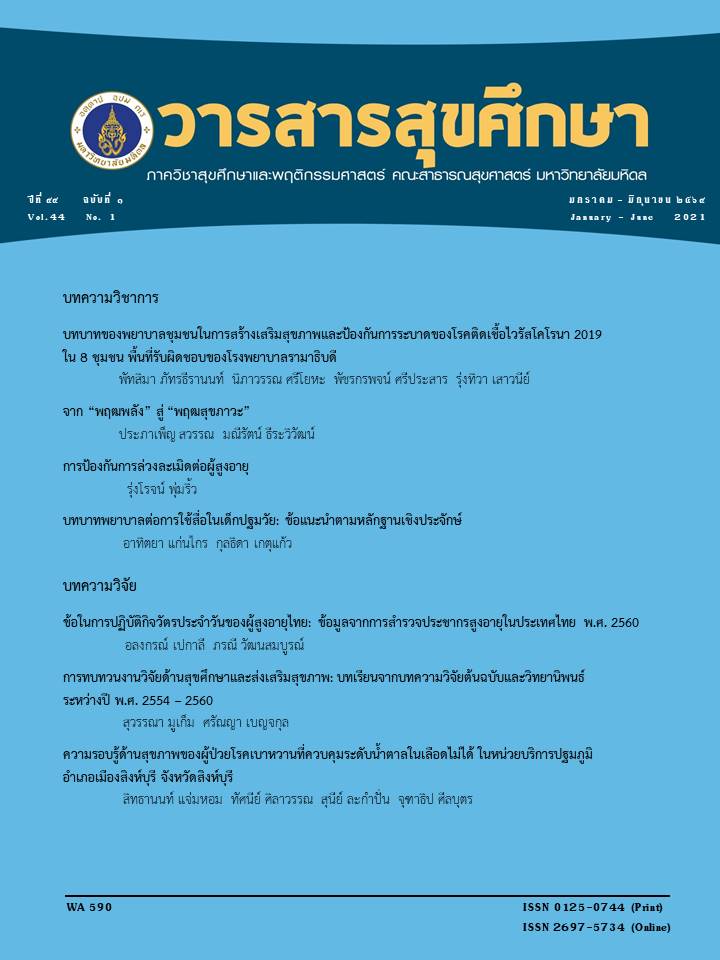Effects of Self-efficacy Promoting Program on Self-Care Behaviors for Hypertensive Patients in Mae Ing Sub-District, Phukamyao District, Phayao Provice
Keywords:
Self-efficacy Promoting Program, Self-care Behaviors, Hypertensive PatientsAbstract
The objective of this study was to study the effects of self-efficacy promoting program on self-care behaviors for hypertensive patients in Mae Ing sub-district, Phukamyao district, Phayao province. This study was quasi-experimental research, two group pre-posted test control group design. Select sample by specific using Inclusion and exclusion criteria, Received a sample of 60 people, After that, a simple random sampling by lottery, divided into 20 people in the experimental group and into 40 person in the control group. Research instrument included self-efficacy promoting program, record form and questionnaires. Statistical methods employed included percentage, arithmetic mean, standard deviation, paired t-test and independent t-test. Results revealed that self-care behavior, systolic blood pressure and diastolic blood pressure between the experimental group and the control group after receiving the program was found significantly different 0.05 (p<0.001, 0.013, 0.042 respectively) and revealed that self-care behavior, systolic blood pressure and diastolic blood pressure between before and after receiving the program in the experimental group was found significantly different 0.05 (p<0.001 Equal)
References
อภิชาต สุคนธสรรพ์, ระพีพล กุญชร ณ อยุธยา, สุรพันธ์ สิทธิสุข, ไพโรจน์ ฉัตรานุกูลชัย, วีรนุช รอบสันติสุข, สมเกียรติ แสงวัฒนาโรจน์. แนวทางการรักษาโรคความดันโลหิตสูงในเวชปฏิบัติทั่วไป. สมาคมความดันโลหิตสูงแห่งประเทศไทย ทริค เชียงใหม่; 2562.
สำนักงานสาธารณสุขจังหวัดพะเยา. Health Data Center [อินเทอร์เน็ต]. 2563 [เข้าถึงเมื่อ 27 สิงหาคม 2563]. เข้าถึงได้จาก: http://www.pyomoph.go.th/
สมเกียรติ โพธิสัตย์ และสุรพันธ์พงศ์ สุธนะ. การแพทย์ไทย. นนทบุรี: กรมการแพทย์ กระทรวงสาธารณสุข; 2557.
สำนักโรคไม่ติดต่อ กรมควบคุมโรค. ประเด็นสารรณรงค์วันความดันโลหิตสูงปี 2562 [อินเทอร์เน็ต]. 2562 [เข้าถึงเมื่อ 27 มกราคม 2562]. เข้าถึงได้จาก:http://www.thaincd.com/2016/news/hot-news-detail.php?id=13507&gid=18
Bandura A. Self-efficacy: The exercise of control. New York: W.H. Freeman; 1997.
Bandura A. A Social Foundation of thought and action. A Social Cognitive Theory. N.J. Prentice-Hall; 1986.
Bandura A. Self-efficacy: Toward a unifying theory of behavioral change. Psychological Review 1977;84:191–215.
Orem DE. Self-Care Theory in Nursing. New York: Springer Publishing Company; 2003.
Bahar G, Scafide K, Krall J, Mallinson K, Weinstein AA. Mediating role of self- efficacy in the relationship between family social support and hypertension self-care behaviours: A cross sectional study of Saudi men with hypertension. International Journal of Nursing Practice 2019;25.
Youngran H, Younghee P. The Effect of the Hypertension Management Program based on Self-efficacy for the Elderly in South Korea. International iInstitute (Tokyo). Information; Koganei 2017; 20:1769-1776.
Moradi M, Nasiri M, Jahanshahi M, Hajiahmadi M. The Effects of a Self-Management Program Based on the 5 A’s Model on Self-Efficacy among Older Men with Hypertension. Nursing and Midwifery Studies 2020;8:21-27
Mazar L, Salimabadi Y, Nasirzadeh M, Safarian E. Self-efficacy analysis of health promoting behaviors of hypertensive patients in Rafsanjan. Pak Heart J 2019;52:313–318.
Hai-Yan S, Jia-Kui Z. Effect of intervention by self-effcacy enhancing on quality of Life of patients with hypertension. Journal of Environmental & Occupational Medicine 2017;34:431.
Huang X, Cheng X. Application of Self-efficacy Theory to Improve Medication Adherence in Hypertensive Patients: an Intervention Study. Journer of the american of cardiology 2017;70:86.
Kauric-Klein Z, Peters RM, Yarandi HN. Self-Efficacy and Blood Pressure Self-Care Behaviors in Patients on Chronic Hemodialysis. Western Journal of Nursing Research 2017;39:886–905.
นวพร วุฒิธรรม. บทบาทพยาบาลในการส่งเสริมการควบคุมระดับความดันโลหิตในผู้ป่วยความดันโลหิตสูง. วารพยาบาลสาร 2562;46:173-182
Fatemeh Mohali F, Mahmoudirad G, Fatemeh Alhani F, Ebadinejad Z, Foroozanfar H. The Effect of Family-centered Empowerment Model on the Indicators of the Ability of Patients with Hypertension. Iranian Journal of Nursing Research 2018;13(5):
ทีปภา แจ่มกระจ่าง, ณัฐสุรางค์ บุญจันทร์, จิรวรรณ มาลา. ผลของโปรแกรมการส่งเสริมสมรรถนะแห่งตนและการสนับสนุนทางสังคมต่อความร่วมมือในการรับประทานยาและความดันโลหิตของผู้สูงอายุโรคความดันโลหิตสูงในชุมชน. วารพยาบาลทหารบก 2560;18:270-279
ภัทรพล มากมี, พิษณุรักษ์ กันทวี, วิภพ สุทธนะ, ธนูศิลป์ สลีอ่อน. ปัจจัยที่มีความสัมพันธ์พฤติกรรมการดูแลตนเองของ ผู้สูงอายุที่ป่วยด้วยโรคความดันโลหิตสูงในอำเภอดอยหลวง จังหวัดเชียงราย. วารสารสุขศึกษา 2562;42(2):86-98
นิศารัตน์ อุตตะมะ และเกษแก้ว เสียงเพราะ, ปัจจัยทำนายความรอบรู้ด้านสุขภาพของผู้สูงอายุกลุ่มเสี่ยงโรคความดันโลหิตสูงจังหวัดพะเยา. วารสารสุขศึกษา 2562;42(2):75-85
ชดช้อย วัฒนะ, จงรักษ์ ศุภกิจเจริญ, ณฐวรรณ รักวงศ์ประยูร, ปริญญา แร่ทอง. ผลของโปรแกรมการส่งเสริมสมรรถนะการจัดการตนเองเพื่อควบคุมโรคต่อพฤติกรรมการควบคุมโรคระดับความดันโลหิต และคุณภาพชีวิตของผู้เป็นโรคความดันโลหิตสูงในการศึกษาระยะยาว. วารสารวิทยาลัยพยาบาลปกเกล้า 2558;26:72-88
ยุภาพร นาคกลิ้ง, ปราณี ทัดศรี. ผลของโปรแกรมการสร้างเสริมการรับรู้ความสามารถตนเองต่อพฤติกรรมสุขภาพของผู้สูงอายุโรคความดันโลหิตสูงที่ควบคุมระดับความดันโลหิตไม่ได้. สมาคมสถาบันอุดมศึกษาเอกชนแห่งประเทศไทยในพระราชูปถัมภ์ สมเด็จพระเทพรัตนราชสุดาฯสยามบรมราชกุมารี 2560;6:27-35
ปาริชา นิพพานนท์ และชุติมา ฆารสมบูรณ. ผลของการประยุกต์ใช้การเสริมสร้างพลังอำนาจและความแตกฉายด้านสุขภาพต่อความแตกฉานด้านสุขภาพ ในการป้องกันโรคความดันโลหิตสูงของผู้สูงวัย ในเทศบาลตำบลอุ่มเม่า อำเภอตลาด จังหวัดกาฬสินธุ์. วารสารสุขศึกษา 2560;40(2):141-156
พิกุลทิพย์ ขุนเศรษฐ, กีรดา ไกรนุวัตร, ปิยะธิดา นาคะเกษียร. ผลของการใช้โปรแกรมการให้ความรู้และสร้างเสริมสมรรถนะแห่งตนต่อพฤติกรรมการดูแลตนเองในผู้ป่วยโรคความ ดันโลหิตสูงชนิดไม่ทราบสาเหตุที่ควบคุมไม่ได้. Journal of Nursing Science 2559;34(4):90-102
ปฐมธิดา บัวสม, ยินดี พรหมศิริไพบูลย์, อติญาณ์ ศรเกษตริน. ผลของการใช้โปรแกรมส่งเสริมสมรรถนะแห่งตนต่อการปรับเปลี่ยนพฤติกรรมสุขภาพของผู้สูงอายุกลุ่มเสี่ยงโรคความดันโลหิตสูงในตำบลรมณีย์ อำเภอกะปง จังหวัดพังงา. วารสารการพัฒนาสุขภาพชุมชน มหาวิทายาลัยขอนแก่น 2560;5(4):550-567



